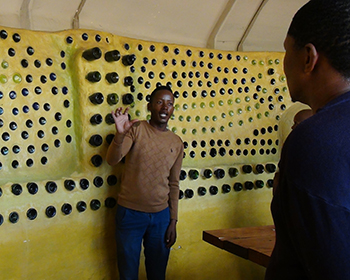Latest News Archive
Please select Category, Year, and then Month to display items
12 January 2024
|
Story Nonsindiswe Qwabe
|
Photo Sonia Small
 Since joining the UFS in 2008, Dr Grey Magaiza has worked extensively on approaches that can foster the socio-economic transformation of societies.
Since joining the UFS in 2008, Dr Grey Magaiza has worked extensively on approaches that can foster the socio-economic transformation of societies.
“The future should be one where communities can decide on their development agenda and futures. That’s the most important for me.” Dr Grey Magaiza, Deputy Director of the Centre for Gender and Africa Studies (CGAS) and Head of the Community Development programme on the Qwaqwa Campus, is passionate about capacitating communities to be agents of change and advancement. His vision for the future emphasises the empowerment of communities to take charge of their development by actively participating in decision making and the implementation of development projects that can improve their lives.
Since joining the UFS in 2008, Dr Magaiza has worked extensively on approaches that can foster the socio-economic transformation of societies. Over the years, he has crafted his research speciality into one that he is most proud of – being an interdisciplinary scientist immersed in the development of communities.
“I’m in a fortunate position of researching what I like. I say ‘fortunate’, because I’ve taken the time to understand what I’m passionate about, which is the overall field of rural livelihoods and livelihood futures – in short, community development. My research starts from an engaged university, understanding the elements that a university must use to enhance transformation and relevance to its immediate community in terms of development.”
One of the ways he has done this is by looking at social entrepreneurship as a development approach for young people in a rural setting. Through workshops with non-profit and civic organisations in Qwaqwa, Dr Magaiza has been helping these organisations to map out their needs and actively meet them through the involvement and support of external role players.
“We understand that communities are part of the national development agenda, but even that national agenda respects community knowledge and intentions and allows communities to shape their identity. A critical enabler of this is community organising. You bring back the capacity in communities to have dialogues on issues affecting them as spaces for engagement, knowledge exchange, and for people to just talk about their way forward.”
By enabling communities to define their development agenda, they can address their specific needs, challenges, and aspirations, he said. “When I look at livelihood futures, it’s quite an exciting aspect of my work – it’s like looking into a fortune tellers’ globe, because you’re not deciding for communities what they should do, but the communities themselves take those decisions.”
Eco-building workshop and rehabilitation through collaboration
2017-03-17

A demonstration of eco-building at Lebone Village
recreation centre
Photo: Supplied
An intimate learning platform was created when Velile Phantsi and Mokoena Maphalane, two community members who had received training in eco-building from the University of the Free State (UFS) Centre for Development Support (CDS) under the Faculty of Economic and Management Sciences, presented a workshop for 10 Free State psychiatric patients in Bloemfontein on 23 February 2017.
Building self-sustaining communities
The training programme took place at Lebone Village recreation centre, at a structure that was built through the eco-building initiative, Qala Phelang Tala (Start Living Green). The collaboration between the Department of Occupational Therapy at the Faculty of Health Sciences and CDS has the potential to address unemployment and housing backlogs and forms a significant part of the rehabilitation of vulnerable people. It has also created prospects for community-based research.
Training and support to rehabilitate vulnerable people
Following the sharing of skills, the Department of Occupational Therapy will continue to work with patients through this community engagement project. Trainees will receive support in building a recreation centre structure at their own complex. During the presentation Mokoena Maphalane shared his personal experience of how physical activity such as eco-building helped him recover from the debilitating effects of a stroke. It is something he hopes will assist other patients in the future.
More information on eco-building.